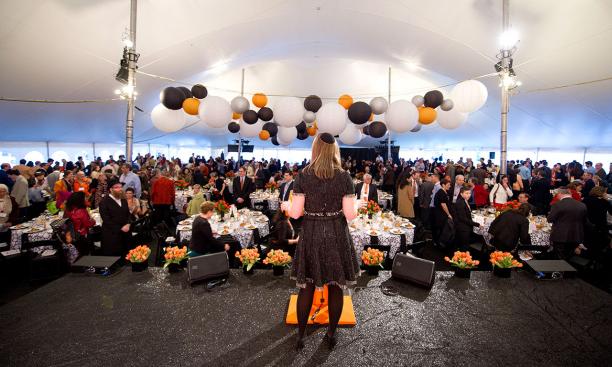
About 900 alumni and guests came to campus April 14–16 to celebrate a century of Jewish life at Princeton. For alumni, the conference — called L’Chaim: To Life! — was a time to schmooze, attend lectures, and recall both the good and the bad of their time at Princeton.
“We don’t want to just say things used to be bad and now they’re fine,” noted President Eisgruber ’83, who participated in much of the conference. Eisgruber seemed to strike a special chord with many participants when he identified himself as Princeton’s “second Jewish president” (Harold Shapiro *64 was the first) and recounted how he discovered his own Jewish roots late in life, a secret hidden by his refugee mother. He poignantly discussed how Jews on campus often felt like both insiders and outsiders. “We love this place but we want to be honest about its history,” he said.
Although Jews have attended Princeton since the 19th century (see timeline), organized Jewish religious activity at Princeton began in 1915–16, when Rabbi Harry K. Jacobs visited the handful of Jewish students. At a lunchtime discussion with Shapiro, former President Bill Bowen *58 noted that over the years, Jewish students often “felt like guests, not hosts” — and he did much to improve the environment during his tenure.
Conference activities included lectures on astronomy, the economy, and Judaic studies; panels on student and religious life; an arch sing by the student a cappella group Koleinu, which performs Jewish music; and a comedic latke-hamantaschen debate (hamantaschen, the pastry ridiculed as “a mere confection” by pro-potato Team Latke, won). Brandeis University professor Jonathan Sarna, a leading scholar of American Jewish history, put the experience of Jews at Princeton into historical perspective, and alumni genealogists gave tips on tracing family histories and finding lost relatives. There were celebrations of Jewish food, music, and jokes.
Jeremy Ben-Ami ’84, founder and president of the liberal “pro-Israel, pro-peace” lobbying group J Street; and Martin Kramer ’75 *82, president of Shalem College in Israel and a scholar of Middle East politics, discussed Israeli policy and Israel-U.S. relations in a lively session that illustrated the policy divisions among American Jews.
Princeton’s Jewish history was uncovered and told in a senior thesis by Abby Klionsky ’14, who found that Jewish life at Princeton was created largely by students. Marcus Lester Aaron 1920 helped form a small student congregation, and in 1919 gathered 10 students for services, forming the first campus minyan, or prayer quorum.
Nearly 30 years later, Ernest Stock ’49, a German refugee whose father survived Buchenwald, co-organized the 1947 service that inaugurated Princeton’s Student Hebrew Association — inviting Albert Einstein, who spoke to the 40 students about the importance of belonging to a Jewish community. (At the alumni conference, Rabbi Julie Roth, executive director of the Center for Jewish Life, looked around the multipurpose room at Frist Campus Center during a prayer service and exclaimed: “Einstein would be amazed!”)
Veterans returning from World War II made Princeton more open, and the “dirty bicker” in 1958 marked the beginning of the end of the old system. “What I found most fascinating and surprising,” Klionsky said, “was the degree to which the Jewish alumni I interviewed did not believe themselves to have been slighted in any way by anti-Semitism on campus.”
Recent decades have seen an increasing willingness to accommodate Jews at Princeton; today, the 23-year-old Center for Jewish Life offers kosher dining, social activities, and religious services. “Once infamous for its anti-Semitism,” said Roth, “Princeton is now positioned as a thought leader and innovator in Jewish life on campus.”
Wrapping up the conference was speaker Mark Wilf ’84, best known for his family’s ownership of the Minnesota Vikings football team. He related how his “Babu Miriam” and father barely survived the Holocaust, and reminded the crowd what a privilege a Princeton education was. He urged participants to “reflect and think about your own journey to get here,” and to stay involved, mentor, and give back.
